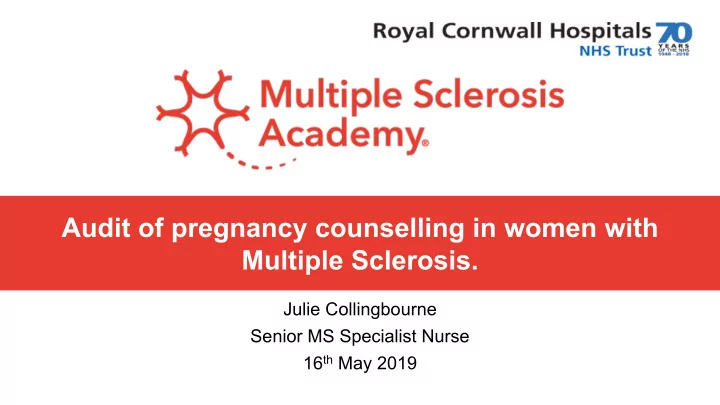

Audit of pregnancy counselling in women with Multiple Sclerosis. Julie Collingbourne Senior MS Specialist Nurse 16 th May 2019
Background Ø There are >100,000 PwMS in the UK. ¹ Ø MS affects 3x more women than men, meaning >75,000 females with MS.¹ Ø Diagnosed typically at 20-30 years Ø Women with MS are keen to have children but often; - Reluctant to speak about family planning with HCPs - Concerns about having children - Raising a child in relation to their MS - National pharma survey; 85% have plans to have a child and 96% think having a family is important. ² - Women with MS want more or better family planning information, covering pregnancy, delivery, caring for children and disease management.² 1, MS Trust . About MS www. mstrust.org.uk 2.Teva UK Limited Family Planning in Women with Multiple Sclerosis (MS) – A national survey May 2018
Background Ø Discussing pregnancy with♀MS prior to a DMT is good clinical practice¹ Ø Data is limited to inform such discussions² Ø DMTs are complex -No UK-wide MS pregnancy register - recommended² Ø Platform - UK consensus guidelines on pregnancy in MS: ‘ABN guidelines’ 2019 ² ( AAN practical guidelines 2018) Dobson R, et al. Practical Neurology 2019;0:1-9 https://www.mstrust.org.uk/pregnancy
Background:Current DMT profile Ø DMTs not licensed during pregnancy, except GA¹ Ø Defer treatment to complete families v risk of early neuroaxonal damage in RRMS¹ Ø Delay Pregnancy ALM 4-months washout • • MAV 6 –months washout OCR 12 months washout • TFM contraindicated • DFM & FGD avoid where possible¹ • Persistent high disease activity Ø -NTZ throughout pregnancy –if benefits outweigh risks¹ Highly efficacious DMT withdrawal - risk of Ø disease reactivation and/or rebound relapse² Ø PO/IVMP during pregnancy¹ 1.Dobson R, et al. Practical Neurology 2019;0:1-9 16/05/19 2.Portaccio et al 2018
Methods Ø Aim : how we discuss reproductive issues, manage MS during pre/ during pregnancy and post-partum Ø RCHT caseload is 1000 PwMS Ø ♀MS cohort who are currently on DMTs : △ childbearing age • ALM 2 nd infusion within last12 months • • Clinical and obstetric letters • Cross-reference within MS team (3x MS CNS’s & 3x Cons. Neurologists)
Results Ø ♀ currently on DMTs, △ MS at childbearing age: N=145 Ø Mean age at △ 32.3yrs (SD 8.5)
Results Ø Of 145♀on DMTs △ MS at childbearing age: • • N=29 pregnancy counselling documented • N=116 presumed DMT booklet or checklist • Ø ? Association with N=29 (20%) completed family prior to DMT; N=10 multiple co-morbidities; N=2 same sex relationship & partners pregnant; N=2 sterile
Results Ø Of 145♀on DMTs △ MS at childbearing age: N=15(10%) pregnant Ø Of 15 pregnant MS: • n=5 NTZ; n=4 IFNB; n=2 GA; n=2 FGD; n=2 DMF • n=15 (100%) documented pregnancy counselling • n=14 stopped DMTs; n=1 IFNB first trimester • n=2 pregnancy relapse; n=4 PP relapse; n=3 changed DMT; n=3 IVMP • n=9 breastfeeding counselling documented
Conclusion Ø Scattered documentation about pre-pregnancy counselling Ø Pre-Pregnancy/ post conception/ breast feeding counselling bullet points for the PwMS and Neuro/obstetric teams (?departmental leaflet) Ø Some reproductive monitoring/ ?women unnecessarily deferring family planning Ø Limitations: no coverage of MS previously DMTs and ♂ fertility Ø Re-audit applying: UK consensus on pregnancy in MS:ABN guidelines¹ 1.Dobson R, et al. Practical Neurology 2019;0:1-9
National Guidelines 1.Dobson R, et al. Practical Neurology 2019;0:1-9
Conclusion; Improving our documentation Provide standard advice – smoking cessation, pelvic floor exercises, recommended supplements • Relapse rate reduces naturally during pregnancy. • MRI is not contraindicated but avoid GAD • • If a relapse occurs steroids can be given during pregnancy and while breastfeeding. • Having MS does not automatically make pregnancy high risk and should not in itself. Discontinue medications whilst pregnant. • Having MS should not influence obstetric management e.g. whether they can have an epidural or spontaneous vaginal delivery. • No additional obstetric scans are required just because a woman has MS. • • Women with MS should be advised that urinary tract infections (UTI) are more frequent in pregnancy and seek prompt treatment from their MS health care professional, obstetric team or GP if concerned. Women who are breastfeeding should be advised to consider storing supplies of breast milk in the freezer for use in case of • relapse associated disability or severe fatigue or in case they need to be prescribed a medication which is not compatible with breastfeeding. • There is no indication to stop breastfeeding if methylprednisolone is required for the treatment of a post-partum relapse. • Women with MS should continue to take vitamin D and their infants should be given vitamin D in line with standard advice. There is evidence of an increased risk of post-partum depression in mothers and fathers with MS. The MS service, midwife, • health visitor and GP should be aware of this and offer appropriate support as required. Neuro-rehabilitation referral if ability to care for baby or herself is compromised and/or seek additional support • 1.Dobson R, et al. Practical Neurology 2019;0:1-9
Conclusion: Provide handouts 1.Dobson R, et al. Practical Neurology 2019;0:1-9
Increased Coverage
Thank you! Acknowledgements Dr Vafa Alakbarzade PhD Caroline Kramarz Abigail Turner Stephen Chan (NeuroPharmacist) RCHT Consultant Neurologists
Recommend
More recommend